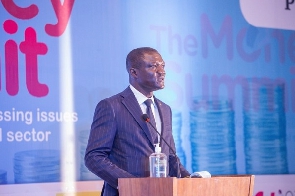 Victor Yaw Asante, CEO of FBN Bank
Victor Yaw Asante, CEO of FBN Bank
Banks’ cautiousness in lending to private sector to support the economic recovery process post-COVID-19, hinges on the framework of collateral processing and recovery, the Chief Executive Officer (CEO) of FBN Bank, Victor Yaw Asante, has said.
According to him, the lack of a collateral tracing system that allows for banks to know the worth of collaterals, as well as the processes of enforcing in the event of default, have contributed to many banks being cautious of lending to the private sector.
Speaking at the maiden edition of the Money Summit on the role of the financial sector in post-pandemic recovery organised by the B&FT, Mr. Asante said: “When we say we are being cautious about lending to the private sector it is in terms of framework, that when you lend money, you want to get it back. If you do not have a framework that allows you to get it back, then you are worried.
If you give me collateral, what is the worth of the collateral? Can I enforce it? For example, I am given a house, the first problem is making sure it is properly registered with the Lands Commission, that it has the proper title, you do that, and you are done,” he said.
Victor Yaw Asante further explained that the second process that is preventing many banks from lending to private sector is the realisation of the collateral.
“If you default and I must take the collateral back, I must go through the court system. Meanwhile, the court system also has its own issues, so it takes a while. While at it, it is still depositor’s money at play and accumulating interest. All we are saying is that until we fix the framework, we cannot lend with careless abandon,” he said.
He further added that the collateral registry and credit bureaus must work hand in hand to ensure that such issues are addressed promptly.
“Sometimes, collaterals are being used two or three times but now we can check that since we now have a collateral registry. We also have the credit bureaus that are working. If these two agencies work first of all to identify people who are serial fraudsters who go from bank to bank, we can take them out.
Also, if there is a court reform that allows certain specific collateral to be realised more properly, then everybody is happy, everybody is free to lend without looking back, but until we have such a thing, it will become difficult for banks to lend with careless abandon,” he said.